JOHANNESBURG (Reuters) - South Africa's rand weakened on Thursday as the dollar hit a fresh two-decade high after U.S. data showed a strong economy, raising more expectations of higher interest rates from the Federal Reserve.
At 1639 GMT, the rand traded at 17.2950 against the dollar, 0.93% weaker than its previous close.
The greenback was last up 0.73% at 109.64, after hitting 109.99 earlier, its highest since June 2002.
It strengthened after a government report showed that the number of Americans filing new claims for unemployment benefits declined further last week, consistent with strong demand for workers and tight labour market conditions.
Analysts are expecting that the U.S. Federal Reserve will hike interest rates by 75 basis points at its next meeting later this month on the back of strong local economic data.
This is not only creating pressure on currencies of advanced markets, but forcing investors to flee to the safe haven U.S. from riskier markets such as South Africa.
"The South African rand is suffering at the hands of declining global risk sentiment on the back of a hawkish Federal Reserve," said Warren Venketas, analyst at forex trading firm IG.
The local currency has lost almost 16% against the dollar in the last five months from its peak of 14.4651 rand against the dollar at the start of April.
The weakening has also been led by cooling off in commodity prices.
Shares on the Johannesburg Stock Exchange (JSE) fell, weighed down by the mining index, which closed 4.51% lower.

Overall on the JSE, the Top-40 index closed down 2.01% while the broader all-share index dropped by 1.84%.
The government's benchmark 2030 bond was down in early deals, with the yield up 11 basis points to 10.550%.